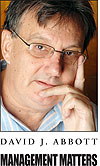“THERE are fifty ways to leave your lover” according to song writer Paul Simon. But, if you can only think of offering the lowest cost, as the one and only way to differentiate your business, then you are in trouble. One of the most profitable ideas is look at your business in terms of Porter’s value chain. Every firm is a collection of activities designed to produce, sell, deliver and support the product or service.


"THERE are fifty ways to leave your lover” according to song writer Paul Simon. But, if you can only think of offering the lowest cost, as the one and only way to differentiate your business, then you are in trouble.
One of the most profitable ideas is look at your business in terms of Porter’s value chain. Every firm is a collection of activities designed to produce, sell, deliver and support the product or service.
Trick being to have your customer be ready to pay more for your product than it costs you to carry out the collection of the activities, the difference is your margin, your profit.
If you can break down those activities, figure out how they much they cost, understand what your customer wants from each of those, make the functions unique, differentiate it, then you will be smiling.
Time will come instead of having to grovel in front of the bank manager, the bank will be running to you wanting to lend you money.
Harvard academic Michael Porter lists about fifty different ways a company can gain a cost advantage and then does the same thing for how one can have their business stand out as unique. Don’t worry, it’s not so difficult.
Imagine you map out the activities in your company, from start to finish, from, for instance, delivery of the raw materials through to the last step, of back up customer service.
That’s step one, step two is – when may realise that you can play with how things are done, reconfigure the value chain to deliver better value for your customers. Classic example of redefining the value chain is the courier company Federal Express.
Traditionally, courier company shipped goods big and small, via airlines, then delivered the goods themselves to the customer.
FedEx decided to focus on delivering only small packages and fly their own planes based on a hub concept in Memphis, Tennessee where parcels were sorted by destination, then flown out again.
As long as the document or package gets to them by 6 pm, delivery is guaranteed by 11 am the next day, anywhere in North America.
Ethiopian Airlines, for many years the only profitable airline in Africa ran a similar hub concept for passengers and cargo out of Addis Ababa. Now Kenya Airways does the same out of Nairobi.
Jorgen Centerman, the CEO of industrial giant, ABB, with a presence in over 100 countries divides his managers into two groups. Those who react to ideas by saying "Yes, but .....” and those who answer "Why not ?”.
While it’s true in business, "that there is nothing so powerful as an idea whose time has come” the tragedy is when the ideas don’t come.
David J. Abbott is a management consultant working in Rwanda


